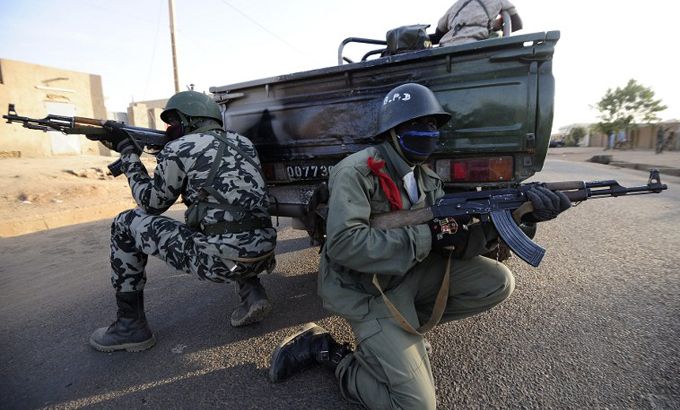Mali rebels launch guerrilla attack on Gao
French general says armed rebels used canoes to cross Niger River for surprise strike on Malian army in northern city.

An armed rebel group, the Movement for Oneness and Jihad in West Africa, or MUJAO, has claimed responsibility for an attack on the city of Gao in northern Mali and a suicide bombing the day before.
Hundreds of residents gathered around the heavily damaged police headquarters building in the center of the city early on Monday, where body parts lay strewn about a day after al-Qaida-linked rebels launched a surprise attack on the city.
“Yesterday we had the gunfire and hid in our homes all evening,” said Soumayla Maiga as he stood with his friends near the rubble of the police offices. “We were stunned when we came out and saw what happened.”
Fighters armed with AK-47 automatic rifles sneaked into Gao on Sunday to launch a surprise attack on the Malian army in the most populous city in northern Mali, two weeks after French and Malian troops routed the al-Qaeda-linked fighters in the city.
The attackers used canoes to cross the Niger River to penetrate Gao, according to French General Bernard Barera, who cited Malian officials.
The combat started at about 2:00pm local time (14:00 GMT) in Gao’s commercial hub and the fighting continued through the night.
Later, the sound of gunfire was replaced by the clattering of helicopters overhead.
On Monday morning, French helicopters fired at a police station at the centre of the clashes, the AFP news agency reported. A tense calm had descended on the city by the afternoon, and it was unclear how many fighters on either side had been killed.
Earlier, on Saturday night, a suicide bomber had detonated his explosives at a checkpoint at the northern entrance to Gao, killing himself and injuring one Malian soldier.
Another suicide bomber, on a motorcycle, blew himself up at the same security post on Friday, killing only himself and injuring a Malian lightly.
Troops at the checkpoint where both suicide attacks occurred said no one else was wounded in Saturday’s blast.
MUJAO’s claim
In a statement to AFP news agency on Sunday, Abou Walid Sahraoui, spokesman for MUJAO, which had already claimed responsibility for Friday’s blast, said: “Today God’s faithful successfully attacked the Malian army, which let the enemies of Islam come to Gao. MUJAO also claims [Saturday’s] suicide bombing … that made the Malian soldiers flee.
“The combat will continue until victory, thanks to God’s protection. The mujahedeen are in the city of Gao and will remain there.”
A witness describing Sunday’s fighting in Gao said the attackers hid in the city’s empty central police station, then attacked Malian soldiers when they arrived.
When reinforcements came, snipers hidden in surrounding buildings opened fire on them.
Fighting also erupted around the governor’s offices.
Rocket-propelled grenade explosions and fire from heavy machine guns and light weapons could be heard in Gao late in the afternoon.
A French Tiger attack helicopter circulated over the neighbourhood and French and Malian forces conducted joint patrols, warning residents that snipers could be hidden in the city.
A death toll could not immediately be established. A Malian officer said “many” rebels had been killed, and a witness reported seeing a body that appeared to be a civilian hit by a stray bullet.
The fighting appeared to centre near the police headquarters, where Malian soldiers with rocket-propelled grenades traded fire with the MUJAO fighters.
Soldiers were positioned at every corner in the neighbourhood of mud-walled buildings.
Ongoing clashes
Since French forces took Gao on January 26, rebels have clashed with security forces on the city’s outskirts.
This was the first time they succeeded in entering the strategic city.
The al-Qaeda-linked fighters seized the northern half of Mali in April 2012, sending poorly disciplined and equipped Malian forces retreating in disarray.
France launched its military intervention in its former colony on January 11 when the fighters, many of whom had fought for ex-Libyan leader Muammar Gaddafi, began encroaching on the south, threatening the capital Bamako, which lies deep in southern Mali, 1,200km from Gao.
France has said that it wants to hand over responsibility to the Malian military and other African nations who have contributed troops and has raised with the UN Security Council the possibility of establishing a UN peacekeeping operation in Mali.